- Home
- Shirlee McCoy
Home with You Page 4
Home with You Read online
Page 4
Six years, two apartments, and a boatload of heartache later, she’d realized that only one of them wanted a monogamous relationship. It wasn’t Jake.
“I don’t bite, Rumer,” Sullivan said with a smile that made her toes curl in the cool grass.
“I’m not afraid of you biting,” she responded. I’m afraid of you breaking my heart. “I need to find my shoes before I go back to the homestead. They’re my aunt’s. Vintage. She’ll be pissed if they’re missing.”
“All right,” he agreed. “I’ll pull your truck out and leave the keys under the mat.”
He didn’t mention the job again and she told herself she was glad. Walking away was the reasonable thing to do, the best thing.
But she couldn’t stop thinking about Moisey dressed in a tutu and tiara wandering away from home. Or the twins, slipping and sliding down the slope that led to the Spokane River.
She reached the side of the house, turned toward the path that led across the field. She’d have followed through with her plan to leave if she hadn’t smelled smoke. Not wood smoke, either. This was a burnt popcorn kind of smoke.
Or burnt cake.
She frowned.
“Just keep going, Rumer,” she said out loud, because she needed to hear the words, and she needed to listen to them. “It has nothing to do with you.”
Except that it did. There were a bunch of kids in that house, and Sullivan was gone, pulling her truck out of a ditch. If someone died because she hadn’t checked things out, she’d never forgive herself.
She hurried back the way she’d come, darting up the back stairs and reaching for the door.
It flew open, and she grabbed it, stepping to the side as smoke and kids poured out.
The twins. Twila. Moisey. Heavenly, the baby in her arms.
She counted heads, then walked inside, Heavenly standing on the threshold and watching as she made her way through black smoke and into the kitchen.
“Why aren’t you gone?” Heavenly demanded.
“Take the baby into the yard until I get the smoke cleared,” she responded.
Heavenly thrust the baby at Twila. “Hold her while I put out the fire.”
“What fire?” Rumer asked, but she could see it now—a charred cake pan sitting in the sink, tiny flames shooting up from it.
She reached over the mess, turned on the faucet and coughed as smoke and steam filled her nose.
“Shit,” Heavenly muttered.
“Language,” Rumer replied.
“Sullivan is going to hit the ceiling when he sees this mess.”
“Who says he’s going to see it?”
“There’s smoke everywhere.” Heavenly dropped into a chair and made a production out of looking at her phone. Obviously, she wasn’t keen on having Rumer around.
“The fire is out. Open the windows. Tell your siblings to come inside.”
“I figured you were leaving, and you could tell them on your way out.”
“You figured wrong.” Rumer turned off the water and surveyed the wreck of a kitchen. No child deserved to have a birthday as bad as this one was shaping up to be. No cake. No presents that Rumer could see. Messes everywhere. The smell of slop and smoke filling the house.
“And?” Heavenly was still scrolling through her phone.
“This place is a disaster. So, how about you get your butt out of the chair and do what I asked? We have work to do.”
That got Heavenly’s attention.
She met Rumer’s eyes, and there was no mistaking her surprise and irritation.
“Who died and . . .” Her voice trailed off, because someone had died, and she must have realized exactly how childish she sounded.
Smart kid with a big attitude.
The smarts could be cultivated and the attitude could be curbed, but that wasn’t anything to do with Rumer. All she wanted was to make sure Twila didn’t have the worst birthday of her life. At least, that’s what she was telling herself.
She suspected it was a lie.
She really did.
Because, she knew herself, and she knew her weaknesses, and these kids and this house and their trouble? They were it.
“Go on,” she prodded. “We don’t have all day to make your sister’s birthday nice.”
Heavenly stared into Rumer’s eyes for another couple of seconds, and then she slowly set the phone down. Slowly got up. Sloooowly went to the back door. Every bit of her scrawny body screaming her displeasure.
She probably wouldn’t have done it at all if she hadn’t been so shocked by Rumer’s insistence.
Rumer grabbed a bottle of dish soap and squirted it into the blackened cake pan. She could hear Heavenly yelling for the crew to come inside, and she grabbed a few dishcloths from a pile near the sink, rinsed them all with hot water, and was waiting when five kids tromped through the mudroom and into the kitchen.
“It’s time,” she said before any of them could escape. “To get to work.”
“What work?” Maddox asked, his hands on his skinny hips, his eyes flashing with ire. She figured he was still angry that she wasn’t his mother.
“Work that’s going to make your mamma happy when she finally gets home.” She held out a rag and he took it, frowning a little but not arguing.
“If she comes home,” Heavenly said morosely. She was holding the baby again, bouncing her gently to keep her from fussing.
“I choose to believe that she will. When she does, do you want her walking into a house caked with food, mold, and soot?” She handed another rag to Milo and one to Moisey.
“I do not,” Twila said, opening a narrow closet and pulling out a broom, a bucket, and a mop.
“That’s what I thought,” Rumer said cheerfully, because at least Twila seemed on board with the plan. “You guys get to work. I’ll start the cake.”
“We used the last box of cake mix, so good luck with that,” Heavenly muttered, but she’d grabbed a clean rag from a drawer and was wiping the baby’s face.
“Boxed cake mix is a luxury for the uninspired. We can manage without,” Rumer replied, opening the window above the sink and letting cold crisp air swirl in. The place still smelled like burnt food and pig slop. Three of the five old-enough-to-work kids were frozen in place, clutching damp rags and staring at her like she had two heads and a forked tongue.
Or, like she was nuts.
Which she obviously was.
She should be searching for her shoes, not pulling eggs out of the fridge and flour out of the pantry closet, but there she was . . . doing exactly what she shouldn’t.
An hour.
That’s how much time she’d give herself to make the cake and straighten the kitchen. Any longer than that and she might start feeling things she shouldn’t. Like sympathy, obligation, concern.
Who was she kidding?
She already felt all those things, but she was still only giving an hour, because it was Saturday, and Minnie had probably gone off to do her weekly garage sale hunting. Lu’s part-time employees only worked weekdays, and at noon, someone would have to check on the horses. Knowing Lu, she’d decide it needed to be done before Rumer or Minnie returned.
Yeah. An hour. That should be just enough time to finish and not enough for Lu to get into trouble.
She eyed the clock, grabbed a clean mixing bowl from a glass-faced cupboard, and began.
* * *
Pulling the truck out of the ditch took a little longer than Sullivan expected. First, it was an old truck—a 1970s Ford. Solidly built and heavy. Second, the back bumper was loose, and he’d had to jerry-rig it before he could attach the towline. He managed it with duct tape and rope he kept for emergencies. It felt good to let off a little steam doing something physical that wasn’t related to housecleaning or kid herding.
Once he had the bumper secured and the towline attached, it took three tries to get enough momentum from his SUV to drag the beast out. He checked the truck, made sure there wasn’t enough damage to keep it from running, pla
ced the key under the driver’s side floor mat, and climbed back into his vehicle. Rumer hadn’t appeared, yet. She was probably still hunting for her shoes. Either that, or she’d decided to take her chances and hitchhike back to wherever she’d come from.
No way would anyone in her right mind take a job like the one he and his brothers were offering. Not after seeing the house, the kids, the chaos. No. A logical, smart and savvy person would take one look at the situation and run. If Matt hadn’t been his brother, if Sunday weren’t his sister-in-law, if the kids weren’t his nieces and nephews, that’s what Sullivan would have done.
As it was, he was stuck.
Matt had been his brother.
Sunday was his sister-in-law.
That made the kids his problem. His very big problem.
He sat in his SUV for a few seconds considering his options for escape. Which were just about none. He was there, thanks to his oldest brother Flynn’s planning. “You’re on sabbatical. We both have things to tie up at home. Give us some time to do that. We’ll come back and discuss long-term plans if they’re needed.”
Sullivan couldn’t deny that the plan was sound or that it made sense. He’d helped create it, for God’s sake—he and Porter and Flynn sitting up into the early hours of the morning hashing things out, deciding what was best for a bunch of kids they barely knew.
God! What a mess!
Three bachelors. No experience. Six kids with backgrounds that would make the hardest heart melt with sympathy. Sullivan didn’t have to read the foster and adoption files to know they’d all been through hell. He could see the scars, the defensive postures, the anger.
He scowled, starting the engine and doing a U-turn, heading back toward the house because it’s what he’d promised to do. He wasn’t sure if Matthias had had a premonition or if he’d just been worried about his family, but three months ago, he’d called and asked Sullivan if he’d be guardian to the kids if anything were to happen to him and Sunday.
Hell no! had been Sullivan’s response.
He regretted that now. Regretted that his brother had gone to the grave with no certainty about the kids’ future. But, Sullivan had promised to keep an eye on things, make certain that whoever was guardian would do right by his nieces and nephews.
This was a lot closer of an eye than he’d planned, but he couldn’t walk away. Not with Sunday in the hospital and everything up in the air. If she survived, great. If she didn’t . . .
He didn’t want to go there.
Didn’t want to contemplate what would happen to the kids.
Matt hadn’t named a guardian in his will.
Sunday hadn’t either.
Which meant that the kids had no one unless one of their uncles anteed up and agreed to take them.
More than likely, they’d split the duties. Four-month stints at the farm, because they’d all agreed the kids shouldn’t be shuttled from home to home.
They’d agreed, but none of them were happy about it.
Not one of them had planned to return to Benevolence for any length of time. Ever. They’d worked too hard, gone too far in their lives to be rerouted back to the place they’d all escaped. Porter had suggested buying a house in a central location and settling the kids there, but Pleasant Valley Farm was their heritage, and Flynn had every intention of seeing it succeed and watching his nieces and nephews take over running it one day.
The fact that he had a cattle ranch in Texas had probably influenced his perspective, but Sullivan had seen his point. Sunday’s family had owned the acreage for five generations. It was the birthright of the next generation, and he wanted the kids to make their own decisions about whether to keep it or not.
Two votes for keeping the kids at the farm. One against.
Porter hadn’t been happy, but he’d conceded defeat and agreed to the plan.
And now he and Flynn were back at their homes, tying up loose ends, putting things in place so they could return and be there when Sunday recovered.
Or didn’t.
And, Sullivan was here. In the second level of hell, knee-deep in kid crap and attitudes.
He parked the truck and got out.
No noise from the house, so that—at least—was good.
One of the boys had left a scooter near the driveway, and he carried it into the two-car garage, setting it next to a row of bikes, trying not to notice the empty bay. His brother’s car should be there. The fancy Corvette that a guy who had six kids didn’t need and really couldn’t use. Why he’d had it was a mystery, but Sullivan had seen the bent carcass, the crushed metal and shattered windows. The fact that Sunday had survived was a miracle. Matt and the drunk driver who’d hit them hadn’t been as lucky.
The medical bills were being paid for. The insurance adjuster had already cut a check for the blue-book value of the Corvette. None of that could bring Matt back or cause Sunday to wake up completely healed. None of it could give the kids back what they’d lost.
He shoved the morose thoughts away.
He had a damn cake to make and a birthday to celebrate.
Twila deserved that. Even if her world was falling apart and all the pieces that had come together to bring her to the USA and to Sunday and Matt and the farm had separated again, she could have cake and a rousing off-tune rendition of “Happy Birthday to You.”
He opened the mudroom door, expecting to hear the usual cacophony of noise—twins playing, Heavenly blasting music, Moisey singing something completely different, Oya crying.
He heard . . .
Silence.
And, that was terrifying.
“Kids!” he yelled, barreling into the kitchen, skidding across a wet floor.
“Careful,” someone said. “The boys just mopped the floor.”
Not someone.
Rumer.
Standing at the sink, scrubbing out a bowl, Moisey beside her with a rag, a pile of sparkling dishes in front of her.
The counter was sparkling, too.
The floor.
The cupboard faces and the pantry door.
All of it . . .
Clean.
“I’ve been gone twenty minutes,” he said, his gaze on the rocking chair that someone had carried from the nursery and set right in the middle of the kitchen floor.
Twila was sitting in it, a plastic crown-like thing on her head, Oya in her arms. She was feeding the baby a bottle and humming quietly.
Tranquility. That’s what he was seeing. Quiet. Order. Structure. All the things he’d dreamed about when he was a kid but had never had. All the things he wanted for Matt’s kids but couldn’t seem to achieve.
“Twenty-five minutes,” Rumer responded, wiping her hands on a dishrag and tossing it into a laundry hamper that was sitting nearby. Empty. Not one towel, rag, or piece of clothing in it. “Not that we were counting.”
“The truck’s bumper was loose,” he offered by way of explanation, and she nodded. No smile. Just that nod and steady gaze.
“It needs a little work. Kind of like this house.” She said it deadpan, but there was a hint of amusement in her eyes. Blue eyes. Or violet. Or some odd shade in between. He wasn’t sure, and found himself staring a little too deeply, searching for a little too long.
If that made her uncomfortable, she didn’t show it. She sure as heck didn’t look away. She just stared right back.
“By a little,” he said. “I’m assuming you mean a lot.”
“Something like that,” she responded. “Fortunately, many hands make light work.” She gestured around the sparkling kitchen. No ring on her left hand. Which he shouldn’t have noticed but did.
“The kids did this?”
“Who else?” She walked to the stove, turned on the light, and peered inside. “This has another fifteen minutes. Don’t open the door until the timer goes off. If you do it’ll sink. Not cute and not yummy.”
“It?”
“The cake? It’s Lu’s pound cake recipe. You’ll want to poke it with a toot
hpick when the timer goes off. If the toothpick comes out clean, the cake is ready. Frosting is here.” She opened the fridge and took out a bowl of what looked like whipped cream. “Twila said she wanted strawberry cake. I suggested strawberry-topped cake, and she thought that would be good. Right, hun?” She touched Twila’s shoulder, and to Sullivan’s surprise, to his absolute shock, Twila smiled.
A sweet, young, unguarded smile. The kind a kid offered when she trusted someone.
“Yes. I think that would be very nice.”
“The strawberries are here.” Rumer pulled a bowl from the fridge and held it up. “Just a little sugar to bring out the juices. Let the cake cool before you cut and top it. No need to frost the whole thing. Just slice it, plate it, and pile on the whipped cream and strawberries. Extra for our birthday girl.”
She lifted the laundry basket and carried it into the mudroom, still talking about the cake and birthdays, candles and singing. He followed her, walking into the narrow room and watching as she tossed the dirty rag into the washing machine.
“I’m turning this on,” she said, closing the door and pushing start. “If you forget to put the load in the dryer when it’s finished, you’re going to have a mess of stinky, moldy towels and dishrags.”
“I may not know how to make a cake, but I sure as heck know how to do laundry,” he said dryly, and she grinned.
“Great, because I had the kids gather all their dirty clothes and pile them on the couch in the living room. Milo is separating light and dark. He’s been at it for a while. Must be quite a lot of clothes.”
“There are seven people in the house,” he pointed out.
Her grin widened. “Right. And, when was the last time any of you ran a load of laundry?”
“Probably . . .” Never. Not that he could recall. “Things have been a little crazy around here. Their mom is in a hospital in Spokane. That’s a forty-minute drive each way.”
“That’s hard, Sullivan,” she responded, all her amusement gone. “It’s difficult on all of you, but kids need structure and order and routine. I don’t want to stick my nose too far into your business, so I’ll just say that a weekly chore chart would be a good idea. Incentives tend to work with kids. A little cash or a special treat. Some kind of carrot dangling in front of their noses.”

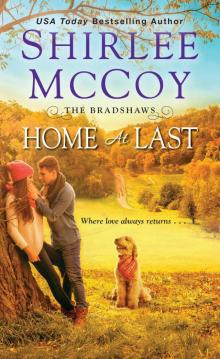 Home at Last
Home at Last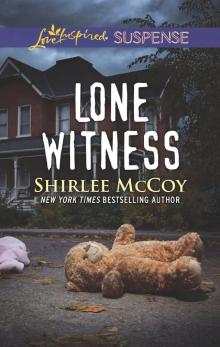 Lone Witness
Lone Witness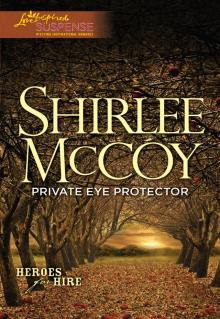 Private Eye Protector
Private Eye Protector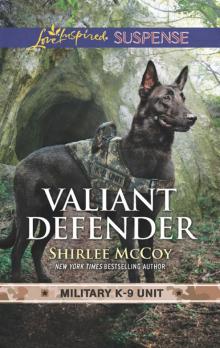 Valiant Defender
Valiant Defender Running Scared
Running Scared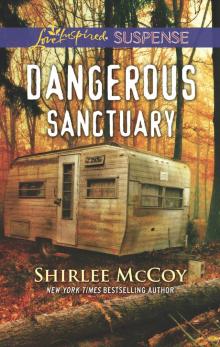 Dangerous Sanctuary
Dangerous Sanctuary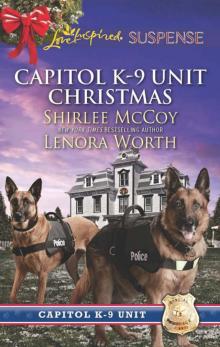 Capitol K-9 Unit Christmas: Protecting VirginiaGuarding Abigail
Capitol K-9 Unit Christmas: Protecting VirginiaGuarding Abigail Hidden Witness
Hidden Witness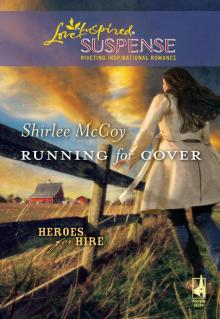 Running for Cover
Running for Cover Gone
Gone Valley of Shadows and Stranger in the Shadows: Valley of ShadowsStranger in the Shadows
Valley of Shadows and Stranger in the Shadows: Valley of ShadowsStranger in the Shadows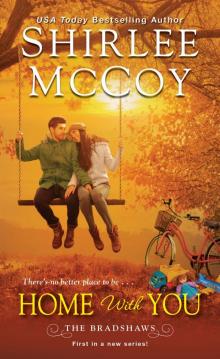 Home with You
Home with You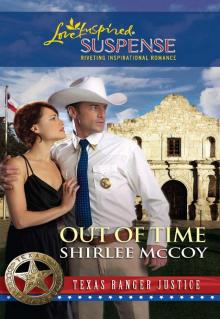 Out of Time
Out of Time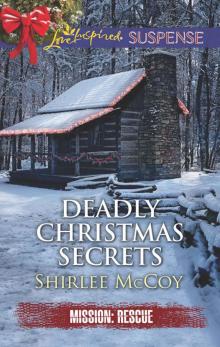 Deadly Christmas Secrets
Deadly Christmas Secrets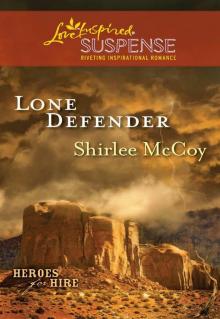 Lone Defender (Love Inspired Suspense)
Lone Defender (Love Inspired Suspense)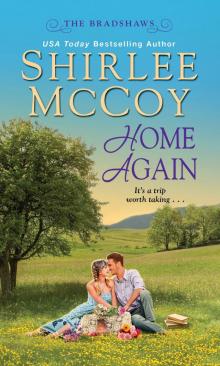 Home Again
Home Again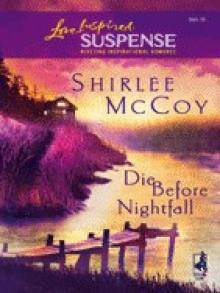 Die Before Nightfall
Die Before Nightfall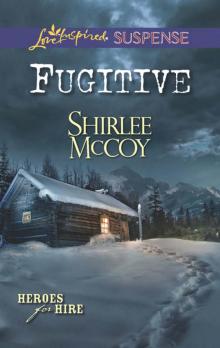 Fugitive
Fugitive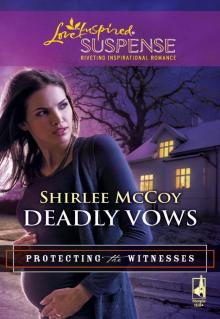 Deadly Vows
Deadly Vows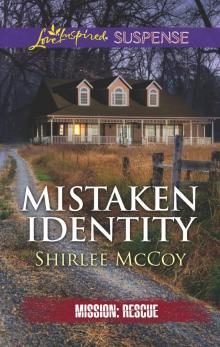 Mistaken Identity
Mistaken Identity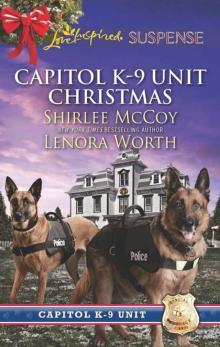 Capitol K-9 Unit Christmas
Capitol K-9 Unit Christmas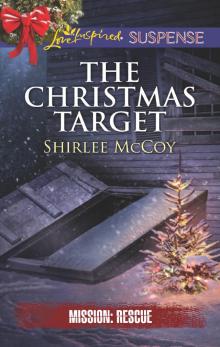 The Christmas Target
The Christmas Target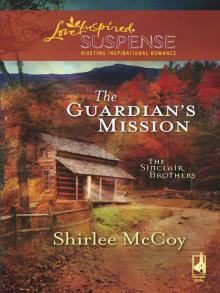 SB01 - The Guardian's Mission
SB01 - The Guardian's Mission Sweet Surprises
Sweet Surprises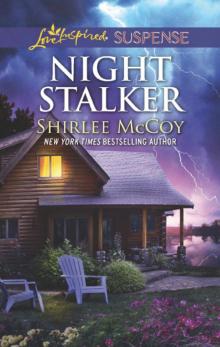 Night Stalker
Night Stalker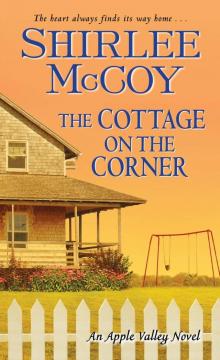 The Cottage on the Corner
The Cottage on the Corner Love Inspired Suspense January 2014
Love Inspired Suspense January 2014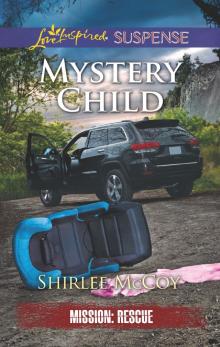 0373447477 (R)
0373447477 (R) Love Inspired Suspense March 2015 - Box Set 1 of 2: Protection DetailHidden AgendaBroken Silence
Love Inspired Suspense March 2015 - Box Set 1 of 2: Protection DetailHidden AgendaBroken Silence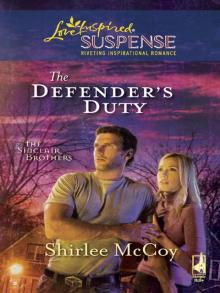 SB03 - The Defender's Duty
SB03 - The Defender's Duty Love Inspired Suspense June 2015 - Box Set 2 of 2: Exit StrategyPaybackCovert Justice
Love Inspired Suspense June 2015 - Box Set 2 of 2: Exit StrategyPaybackCovert Justice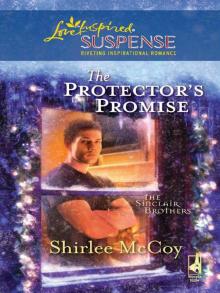 The Protector's Promise (The Sinclair Brothers)
The Protector's Promise (The Sinclair Brothers) Bodyguard
Bodyguard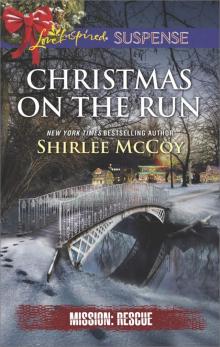 Christmas on the Run
Christmas on the Run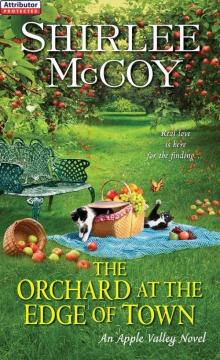 The Orchard at the Edge of Town
The Orchard at the Edge of Town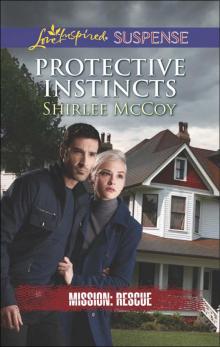 Protective Instincts
Protective Instincts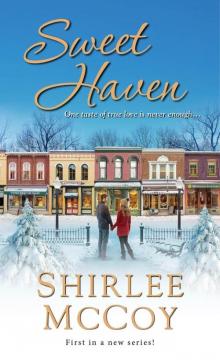 Sweet Haven
Sweet Haven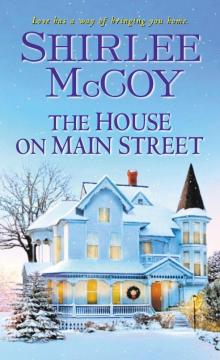 The House on Main Street
The House on Main Street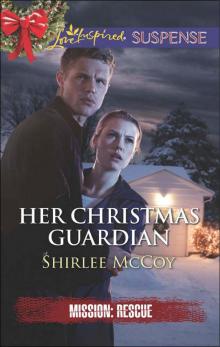 Her Christmas Guardian
Her Christmas Guardian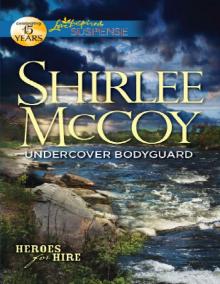 Undercover Bodyguard
Undercover Bodyguard